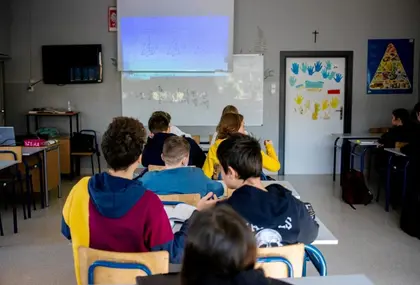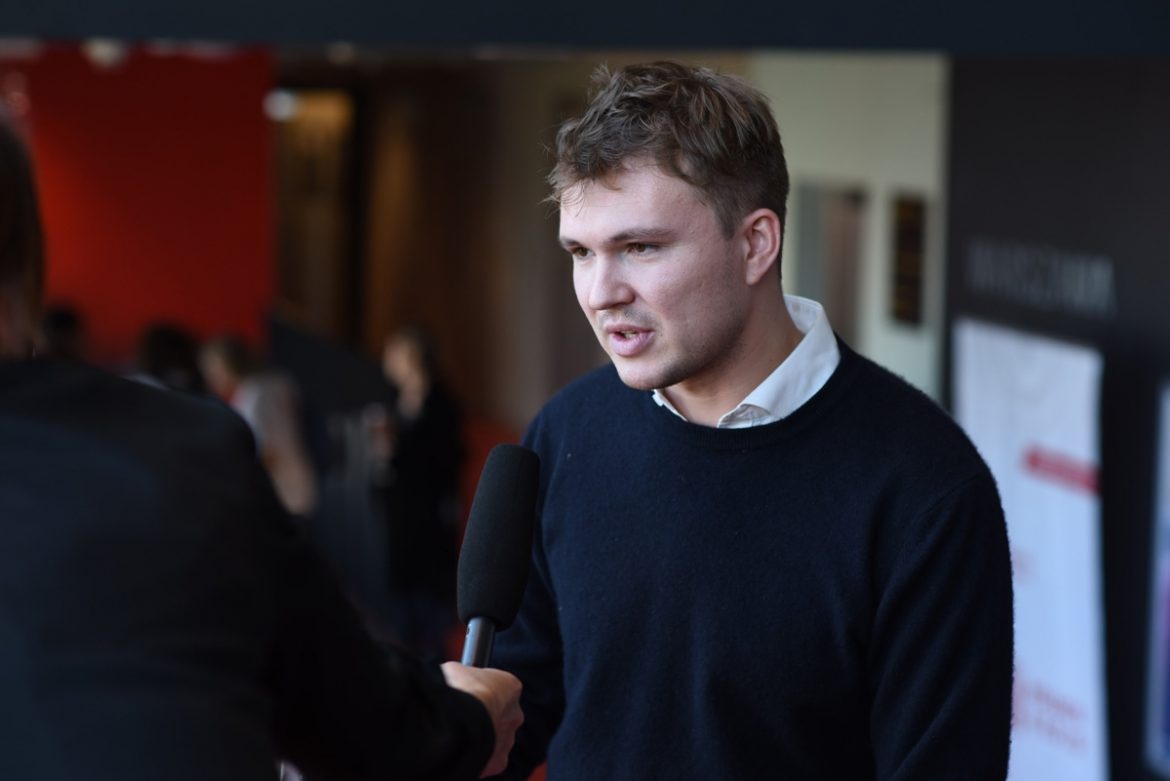With millions of Ukrainian children fleeing from the war, Poland opened its arms to them. More than a half year after the invasion began, Poland continues to find new ways to make their guests feel at home.
As the full-scale Russian invasion of Ukraine began during the early morning hours of February 24, 2022, millions of Ukrainians fled to neighboring Poland to escape the war. Though many refugees then went on to other European countries, a large portion decided to remain in Poland.
JOIN US ON TELEGRAM
Follow our coverage of the war on the @Kyivpost_official.
“We knew that something must be done,” said Stefan Tompson.
In an exclusive interview to the Kyiv Post, Tompson, a Polish-South African TV presenter, commentator and documentarian involved in the humanitarian effort and in documenting it, said that the outpouring of Polish solidarity was a historic event, demonstrating “what a Christian society is in practice.”
“It has been incredible to see millions of refugees with virtually no refugee camps. This crisis showed the very best of Poland and of its national character: hospitality, generosity and a profound empathy for their neighbors. Incredibly enough, despite the huge numbers of refugees, six months in, there are virtually no social tensions and the government has handled the logistics surprisingly well. It will be interesting to see how these efforts continue now that the summer is coming to an end and the school year is about to start, especially given how many of the refugees are children,” remarked Thompson.

Trump Makes 90 Day Foreign Aid Freeze – Ukraine Military Support Supposedly Untouched
Current estimates put the number of Ukrainian refugees, 90 percent of whom are women or children, at around 1.5 – 2 million persons. Such a high number of unknowns make planning for the upcoming school year which starts on September 1 complicated.
Poland’s education ministry has estimated that there were around 200,000 Ukrainian children in Polish schools during the spring semester of last academic year. The ministry has said that it expects this new school year could see a spike with between 200,000 – 300,000 additional Ukrainian children learning via the Polish educational system.
Though exact numbers of kids about to start school are unclear, what is known is that as of the beginning of July, 1.2 million Ukrainians have received their Polish national identity number (PESEL). Of those 1.2 million refugees, 46.5 percent, or 558,000, are children.
Oleksiy Goncharenko, a Member of the Ukrainian Parliament, said that Poland had done remarkable things to support the Ukrainians arriving in their western neighbor.
“The first step was to provide millions of people with essentials – a safe place, water and food. This weight was picked up by Polish civil society but the Polish government was aware that the public could not carry the burden alone,” said the Ukrainian Parliamentarian.
Despite earlier projections that Poles, who are often cast in the European press as being anti-immigrant, would grow tired of the Ukrainians seeking safety in their country, a poll by the Centre for Public Opinion Research (CBOS) in August found that 84 percent of Poles supported welcoming Ukrainian refugees.
Understanding that many of the children who have fled Ukraine are in obvious distress – the vast majority without their fathers and without any clear idea when, or if, they will ever be reunited with their families – Polish state-owned companies, with the full support of Deputy Prime Minister Jacek Sasin, developed ways to make sure that Ukrainian children are provided with a framework and activities that make their lives as refugees in Poland more bearable, or even enjoyable.
One such plan was the Dobre Kolonie (Good Summer Camps) organized by Polish insurance behemoth PZU, which is 35 percent owned by the Polish state treasury. Their idea was simple – to bring Ukrainian and Polish children together and make sure they have plenty of activities and sports in a beautiful setting.
As soon as the last school year concluded, hundreds of Ukrainian and Polish children headed to the serene Masurian Lake District of northeastern Poland to enjoy a camp designed for them to enjoy outdoor activities, such as kayaking, archery, sailing, and windsurfing.
Demonstrating the larger support that Ukrainians receive in Poland, a number of celebrities and VIPs visited the camp, including Wojciech Modest Amaro, a well-known Polish television chef. The owner of Poland’s first Michelin-star restaurant, Atelier Amaro, the chef visited the kids and showed them a few culinary tricks to cook up some of the best known Ukrainian and Polish dishes.
Tompson was present at the camp and noted that, “an important aspect of the Dobre Kolonie summer camp is that it reflects the general Polish attitude towards Ukrainians. Despite the Polish demographic challenges, there is no attempt to force assimilation on Ukrainian migrants or refugees.
“As a British-born, Polish-South African, whose Polish side of the family found itself stuck in the UK after WWII due to communism in Poland, I have personally witnessed how easy it is for refugees, especially their children, to lose the identity of the country their parents left,” remarked Tompson.
Tompson explained ”At Dobre Kolonie, Ukrainians were provided the opportunity to share, play, and just spend time with their Polish contemporaries – the key here is to make them feel part of Polish society, and to let them call Poland home – but only if they so choose.”
Looking back at the summer camp which he indirectly made happen, Deputy PM Sasin said that “thanks to the PZU organized summer camps, children from Ukraine and Poland can spend their summer holiday together and integrate. It makes it possible for the Ukrainian children to take their mind off, even if just for a moment, the hell of war that is taking place across our eastern border.
”The decision to launch the camps was born out of a real desire to help the newly-arriving Ukrainians. PZU, the insurance company, had already been providing substantial medical and material support for Ukrainian children since the war began,” said Dr. Beata Kozłowska-Chyła. However, it became clear that more must be done to help the children cope with their new environment and get their minds off of the tragedy unfolding in Ukraine.
German member of the European parliament, Dennis Radtke, said that Poland’s energy for helping Ukrainian refugees was impressive, demonstrating the great hospitality of the Polish people, which underscored that “Poland, and the broad central and eastern European region has been at the very forefront of humanitarian efforts towards Ukraine”.
Recognizing the great value of the Polish program, Radtke said that it was necessary for officials to act so that greater funding is made available for such programs. He continued that the “passion we see in the people helping Ukrainian children should be seen as an example for everyone in the EU.”
Goncharenko, the Ukrainian member of parliament, said that the summer camps were “an excellent example of the benefits of integration over assimilation, giving young Ukrainians the chance to meet their Polish counterparts without obscuring their own national identity.
””Hopefully,” concluded Goncharenko, “many of the friendships made this summer will endure, whether in Poland or, if Ukrainians make it back home, across the Polish-Ukrainian border.”
You can also highlight the text and press Ctrl + Enter











